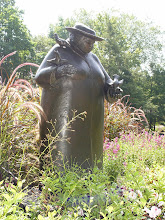This weekend, breaks taken from grading research projects were generally spent on the exercise bike, watching bits and pieces of the PBS documentary on West Virginia history. Though I've worked in the state for more than twenty years now, I've never really known its history. Watching the program, my adopted state struck me as a tragic place from its beginning.
Allen Eckert spoke of the neutrality of the area south and east of the Ohio River in the days before European settlement. None of the indigenous tribes had permanent settlements here but used the land as a neutral hunting ground. In Eckert's words: "when they were in this hunting ground it was a neutral ground. It was where they could co-mingle, where they could meet, they could talk, and nobody would kill each other." Of course, all that changed when colonists and rapid economic development (18th-century style) arrived, resulting in the Indian wars and the slaughter of numbers of people on all sides. After the Civil War, when West Virginia was created as part of the Union, former slaves were persecuted for seeking education and their white teachers threatened. One woman from Maine kept an axe and a gun by her bed to "sell my life as dearly as I may." Only five years after statehood, former Confederates were in control, with control by railroads and industry soon after that.
It had always seemed to me that West Virginia has been basically a colony of the wealthier areas of the United States, a place used for its natural resources but otherwise ignored. The documentary confirmed that idea, but the real tragedy is that so few people here seem to resist their colonization by the coal and chemical companies. When the Upper Big Branch mine disaster occurred, leading to calls for Massey Coal's prosecution, one of my students commented on Facebook that the disaster was largely the miners' fault and that the company shouldn't be blamed. Visiting the southern counties last spring, I met people who worked in mountaintop removal mining and insisted that West Virginia "needed" to sell all its minable coal, since more than half of its mountains would remain. The brother of a county extension agent sang the praises of the (not even ironically named) "King Coal Highway" being built with company funds on some of the newly-flat land. I resisted the urge to ask who the peasants were if coal is still king.
Of course it is true that the southern counties are still poor, and coal is still the only game in many towns, but seeing people embracing coal and blaming those who want to break its grip on the state was an unsettling experience. I wonder if West Virginia will ever cease to be a "dark and bloody ground."

No comments:
Post a Comment